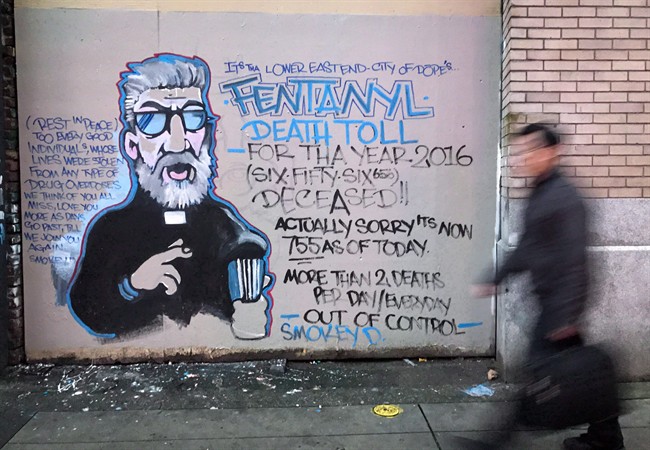The Vancouver Police Department (VPD) says it supports giving drug addicts ‘clean’ opioids in an effort to curb the opioid crisis on the Vancouver streets.

The clean opioids would have known contents and would prevent addicted people “from contributing to the organized and disorganized crime-fuelled drug market through the purchase and use of contaminated street drugs,” according to a report from the VPD called The Opioid Crisis: The Need For Treatment On Demand.
The department is calling for expanded opioid assisted therapy programs, addiction treatment and an increase in public awareness to support prevention.
Just last week, the VPD reported four overdose deaths, bringing the total to a record estimate of 158 deaths so far this year. In 2016, 913 people in B.C. died from drug overdoses, with 216 being in Vancouver alone. Fentanyl was detected in approximately 60 per cent of those deaths.
The VPD says the lack of evidence-based addiction treatment services “contributes to a broad range of health and community harms that extend well beyond fatal overdoses. These harms can be prevented by investment in addiction care.”
READ MORE: Mayors across the country call for feds to lead on opioid ‘national emergency’
The recommendation for clean opioids is only one of five included in the VPD report.
They also recommend expanding federal and provincial government support and accountability, saying a functioning system for addiction prevention and care has long been neglected.
They would like to see a system put in place for immediate evidence-based addiction treatment, including the opening or re-opening of in-patient beds for severe cases and make sure the system allows first responders or addicted people to immediately gain access to assessment and evidence-based treatment.
Their fourth recommendation is to create a system that allows health professionals to enter and track information about addiction care. “The lack of health informatics creates a situation where policy-makers do not have the information needed to address system gaps and other problems,” say the VPD. “This crucial information and data gap must be addressed.”
Finally, they would like to see an increase in public awareness to support prevention through education. They would like more education for students about the dangers of opioid use, overdose prevention and responses to overdoses.
“Vancouver’s overdose death toll in the fentanyl crisis continues to spiral out of control,” said Vancouver Mayor Gregor Robertson in a release. “We need swift and comprehensive health-care interventions to get people the treatment they need, when they need it, to reduce and ultimately eliminate deaths from drug overdoses.”
RELATED: RCMP dogs helping in the fight against fentanyl
“There is strong momentum and support for effective treatment like clean prescription drugs among health providers, first responders, front line workers, people with lived experience, and city staff. The status quo clearly isn’t working, and it’s essential that the next B.C. government urgently funds the health care needed in our communities to save lives.”




Comments